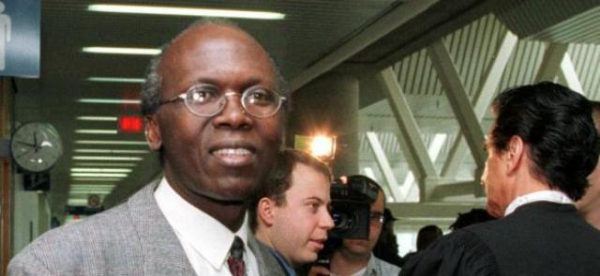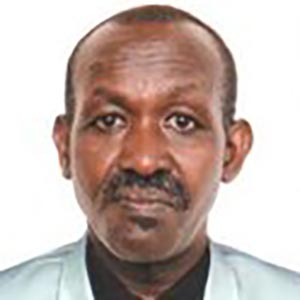A week after academic Léon Mugesera was sentenced to life in jail, Rwandans are still talking about his inflammatory 1992 speech that incited genocide. His trial is viewed as a model against “the ideologues of genocide” and against “words that kill”. Ibuka, the main group representing Rwandan genocide survivors, sees his trial as a strong message to the ideologues of genocide.
On the south-eastern outskirts of the Rwandan capital Kigali, there is a memorial on the banks of the River Nyabarongo, a tributary of the Akagera and so of the Nile. Engraved on the memorial are 700 names that bear witness to the effects of the speech that got Mugesera jailed for life. For survivors who came last Sunday to remember the dead, the echoes of his speech still seem to point to the river and say “your home is in Ethiopia, and we will send you back along the Nyabarongo River so you get there quickly”. But since Friday, the survivors also hear the judge’s voice reading the verdict against Léon Mugesera… “Life in jail!”
On the day of the judgment, the famous linguist extradited from Canada four years ago listened attentively like everyone in the courtroom to the words of that speech delivered on November 22, 1992 and considered an explicit call to commit genocide against Tutsis. (Unfortunately for him, the speech was recorded.) Leaning over the notes he took during the three-hour delivery of the judgment, Mugesera, 63, finally raised his head and looked at his judges, listening to the verdict. “The Court finds Léon Mugesera guilty of direct and public incitement to commit genocide, persecution as a crime against humanity and complicity in genocide,” declared Judge Antoine Muhima, “and sentences him to imprisonment for life.” The Court nevertheless found him not guilty of conspiracy to commit genocide because, as the judge explained, “the fact he was applauded and followed by the crowd does not mean there was a conspiracy.
“The tongue that sharpened the machetes”
Mugesera, a former teacher at the National University of Rwanda, was a political advisor in the MRND party of assassinated ex-president Juvénal Habyarimana, and is often seen as a leader of the party’s “Hutu power” faction. The racist propaganda of that faction presented the Tutsi minority as originating from Ethiopia, and Mugesera’s 1992 speech threatened to send them back there swiftly and violently. The judgment also says that Interahamwe militia attacked, hunted down and killed Tutsis directly after the speech delivered in Kabaya (northeast Rwanda).
David Ngirinshuti is a Hutu from Ngororero, who heard Mugesera talked of as an “eminent politician”. He came to hear the verdict against the man “whose tongue sharpened the machetes”. He thinks Mugesera should have got an even heavier sentence, although the death penalty has been abolished in Rwanda. This view is shared by many survivors in the Mageragere district of Kigali whose loved ones were drowned in the River Nyabarongo. “He reminded the old people of weapons they had used in 1959 and told the young about it. Even if he was not there, his lesson was carried out to the letter,” says Esther, an elderly woman who lost two of her children.
Rwandan prosecutors and Ibuka point to this judgment as a reminder that there is no time limit on punishment for the crime of genocide, and that justice will catch up with its ideologues. “This architect of genocide has been convicted for crimes committed 24 years ago, and before 1994,” prosecution spokesman Faustin Nkusi points out. Ibuka president Jean-Pierre Dusingizemungu thinks the verdict is a clear message to both the victims and the perpetrators of genocide. “The bell has tolled for anyone who taught genocidal ideology,” he says. “Justice will catch up with all the ideologues, no matter how much time it takes.” Dusingizemungu also sees this judgment, handed down as Rwanda held genocide commemorations, as “balm for the wounds of the victims and genocide survivors”.
The evangelist of genocide
As a good Christian, the orator made references throughout his speech to the Bible, but using apocalyptic passages adapted to convince his audience. For example: “In the gospel it is written that if someone slaps you on the cheek, give the other one so he can hit it as well. I am telling you that this gospel has changed in our movement. If someone slaps you on the cheek, hit him twice on the other, so he will fall to the ground and will not able to regain consciousness.”
Mugesera pronounced a death sentence on families whose children were joining the ranks of the rebel Rwandan Patriotic Front (RPF). If the judicial system was not going to impose it, then the population should do so, he said, by “exterminating this rabble”. Once again he made reference to the Bible: “I tell you in all truth, as it says in the Gospel, when you allow a serpent biting you to remain attached to you with your agreement, you are the one who will suffer.”
He again used allusions to the Bible to attack members of the government delegation that took part in the 1992 Arusha peace talks. He called the head of delegation, Foreign Minister at the time Boniface Ngulinzira whom he had previously called a “cockroach”, “God born of God”. Very early on the morning of April 7, 1994, less than eight hours after Habyarimana’s plane was shot down over Kigali, this opposition minister was assassinated by members of the Presidential Guard.
Tom Ndahiro, a researcher on the Rwandan genocide, says Mugesera’s “Kabaya speech” had power to convince people because of his rhetorical skills, references to the Bible that stirred people’s fervour and also its historical references. The effects were direct, according to him. “People were attacked while Mugesera was still taking a break in the vicinity,” he says. Later, some terms of the speech were taken up in chorus by the killers, such as “Go via the Nyabarongo, so you will get back more quickly to Ethiopia, where you belong!”
The biggest fish tried in Rwanda
The Mugesera judgment is important on several levels. This was the first case referred to Rwandan courts by a foreign jurisdiction, even before transfers from the International Criminal Tribunal for Rwanda (ICTR). It is significant also because Mugesera was political advisor to the MRND, considered as the instigator of the genocide, head of the commission overseeing MRND reform and also MRND Vice-President for the northern region of Gisenyi. This makes him the only “big fish” so far tried for genocide in Rwanda.
Also, he was prosecuted for crimes committed before 1994. Shortly after his speech, a Rwandan government arrest warrant forced him to flee the country, eventually settling in Canada. Wanted by the post-genocide Rwandan government, the battle for his extradition lasted more than 15 years. He finally lost, and was sent back to his home country on January 24, 2012, to face justice.
No defence witnesses
Since the start of the trial on January 2013, it has been fraught with obstacles and postponed more than 100 times. First, the Accused requested in vain that it be held in French, because he claims he no longer masters his native language Kinyarwanda. And then, more fundamentally, was the problem of judicial assistance to the Defence, where no agreement was reached between the Accused and the Ministry of Justice.
For the Defence, this means not only that the defence lawyer was not properly paid, but also that there was an “inequality of arms” resulting in an unfair trial, according to Mugesera’s counsel Félix Rudakemwa. He says the judges showed “bad faith” with regard to the list of defence witnesses, including Koffi Annan, Boutros Ghali and detainees of the ICTR, who were rejected “out of hand”. He hopes the Supreme Court will correct such errors on appeal, because “nowhere in the world can a trial be seen as fair and balanced if there are no defence witnesses”.
As the trial closed on October 14, 2015, the Defence presented neither conclusions nor a final argument. Mugesera considers that his rights have been violated, and says he will appeal the verdict.







